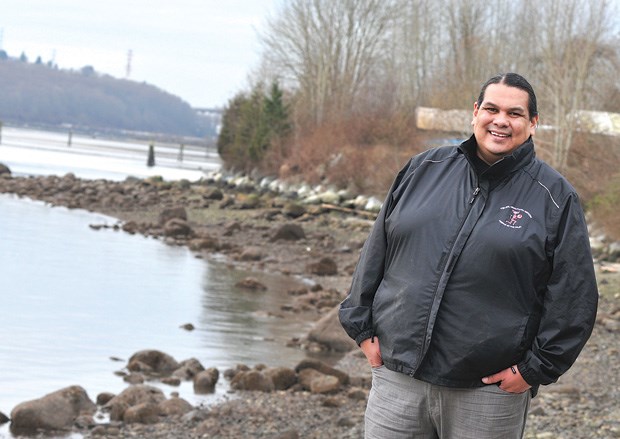Generations ago, Tsleil-Waututh Nation members had a saying: “When the tide went out, the table was set.”
It was a reference to the abundant fish, shellfish and wildlife that inhabited the Burrard Inlet area that contributed to the nation’s subsistence economy.
But that’s changed over the decades. Pollution caused the closure of shellfish harvesting in the early 1970s, salmon stocks have dwindled and access to other inlet resources is now limited.
In an effort to restore the health of Burrard Inlet the North Vancouver-based First Nations group recently released a science-based draft plan entitled: Burrard Inlet Action Plan: A Tsleil-Waututh Perspective.
“The history of who we are is directly related to the Burrard Inlet. Burrard Inlet in our language is Tsleil-Waututh,” said Reuben George of the Tsleil-Waututh Nation.
George said 85 per cent of his ancestors’ diet was harvested from Burrard Inlet – year-round salmon, clams, crab, trout, seals and even whales.
“It was just abundant.”
But a locally harvested ocean diet is no longer possible.
“It’s brutal because of the fecal coliform level, the pollution that’s in there, it’s all affecting what we have,” said George. “I’m only one generation removed from a traditional diet. My grandfather was still eating a traditional diet.”
Biologist John Konovsky, one of the authors hired to write the draft environmental stewardship report on Burrard Inlet, said the intent of the plan is to start a community stakeholder dialogue about how to best improve environmental conditions of the inlet.
“We want to get to a point where everyone around Burrard Inlet can support the plan,” he said.
In an effort to gather more input, the report is scheduled to be discussed at the Burrard Inlet Science Symposium May 19 at the Stanley Park Pavilion.
Atop the list of six priority actions in the report is updating water quality objectives for Burrard Inlet.
“Water quality objectives for Burrard Inlet are very outdated and don’t protect everything Tsleil-Waututh wants to protect,” said Konovsky.
Other priorities include installing scientific instruments to monitor water quality in Burrard Inlet; reducing pollution from storm-water runoff; mapping nearshore habitats and fish spawning beaches; conserving critical nearshore habitat complexes; as well as recovering shellfish beds.
“We want to think about dealing with it from a holistic perspective and make some strategic choices that will benefit the inlet and increase access to resources, you know clean beaches . . . shellfish. . . . Yes we can go out on the beach and dig clams but most places around Burrard Inlet they are unsafe to eat,” Konovsky said.
Konovsky is optimistic that the health of the inlet can be restored over time.
“If you’re speaking about shellfish in particular it’s sooner rather than later,” he said.
George says the Tsleil-Waututh Nation is dedicated to protecting the environment and actively investing in green energies like solar power and wind turbines.
George always remembers a documentary in which his grandfather, Chief Dan George, sat on a beach in Tsleil-Waututh lamenting that his children will not experience the water like he has.
“And I say that. In my short lifetime I’ve seen significant differences,” George said.
But he’s optimistic that efforts to restore balance to nature can reverse some of the damage.
He points to his nation’s project to reintroduce elk to traditional territories. That project has helped bring back wolves, grizzlies and even certain types of singing birds. The returning singing birds have been accompanied by certain species of flowers.
“It’s starting to complete the ecosystem of how it originally was just by introducing one species. So when we rehabilitate it’s bringing back what our community wants. What our elders want.”
George said that just a decade ago the nation’s local salmon count was under 6,000 but has since rebounded.
“I was up there this year and counted over 1.2 million salmon in one day up in Indian Arm,” he said.
“We can reverse some of the things that have been happening and it’s really, really important to us.”



